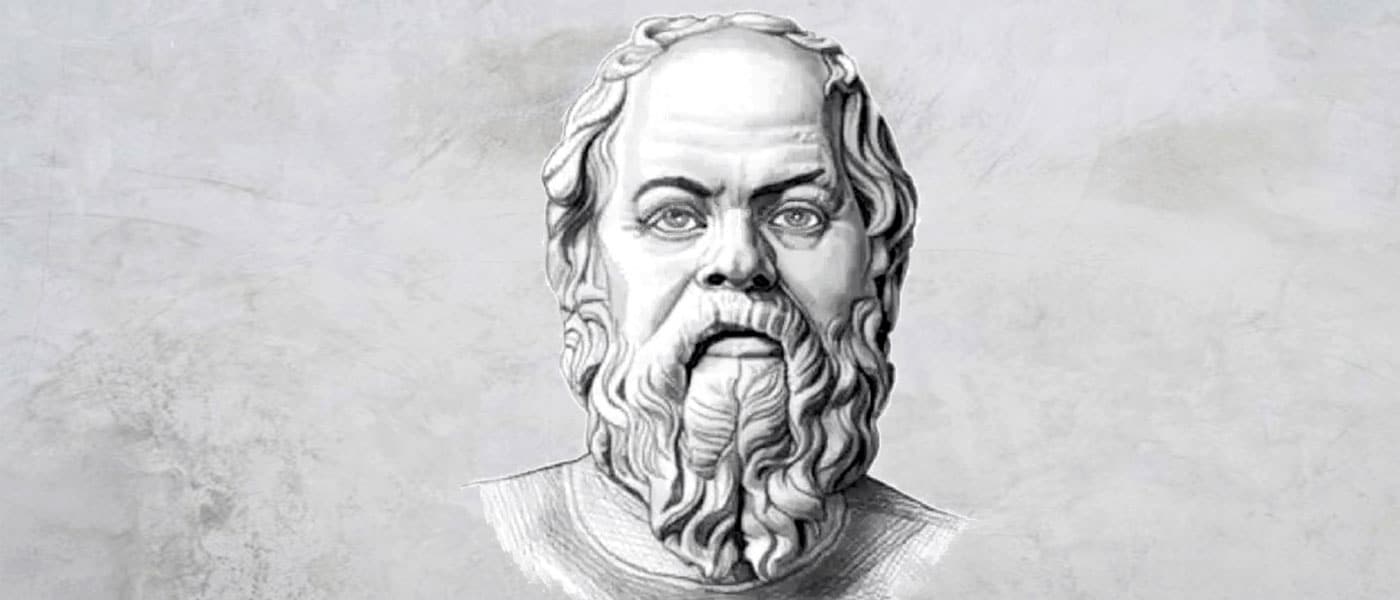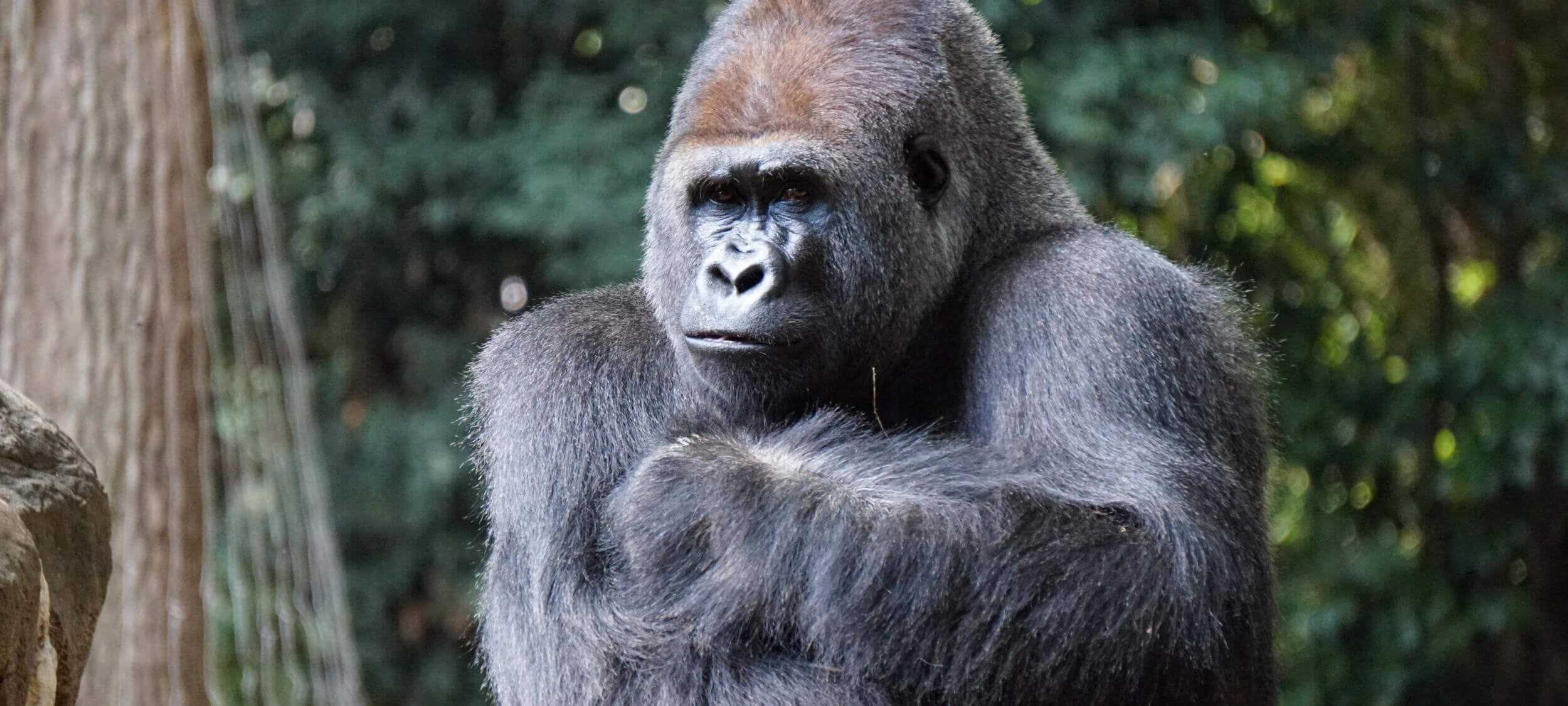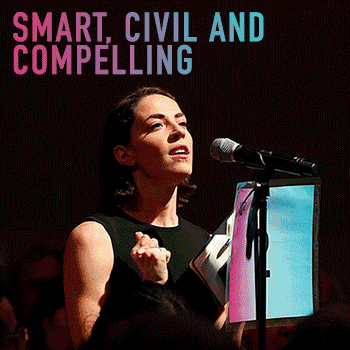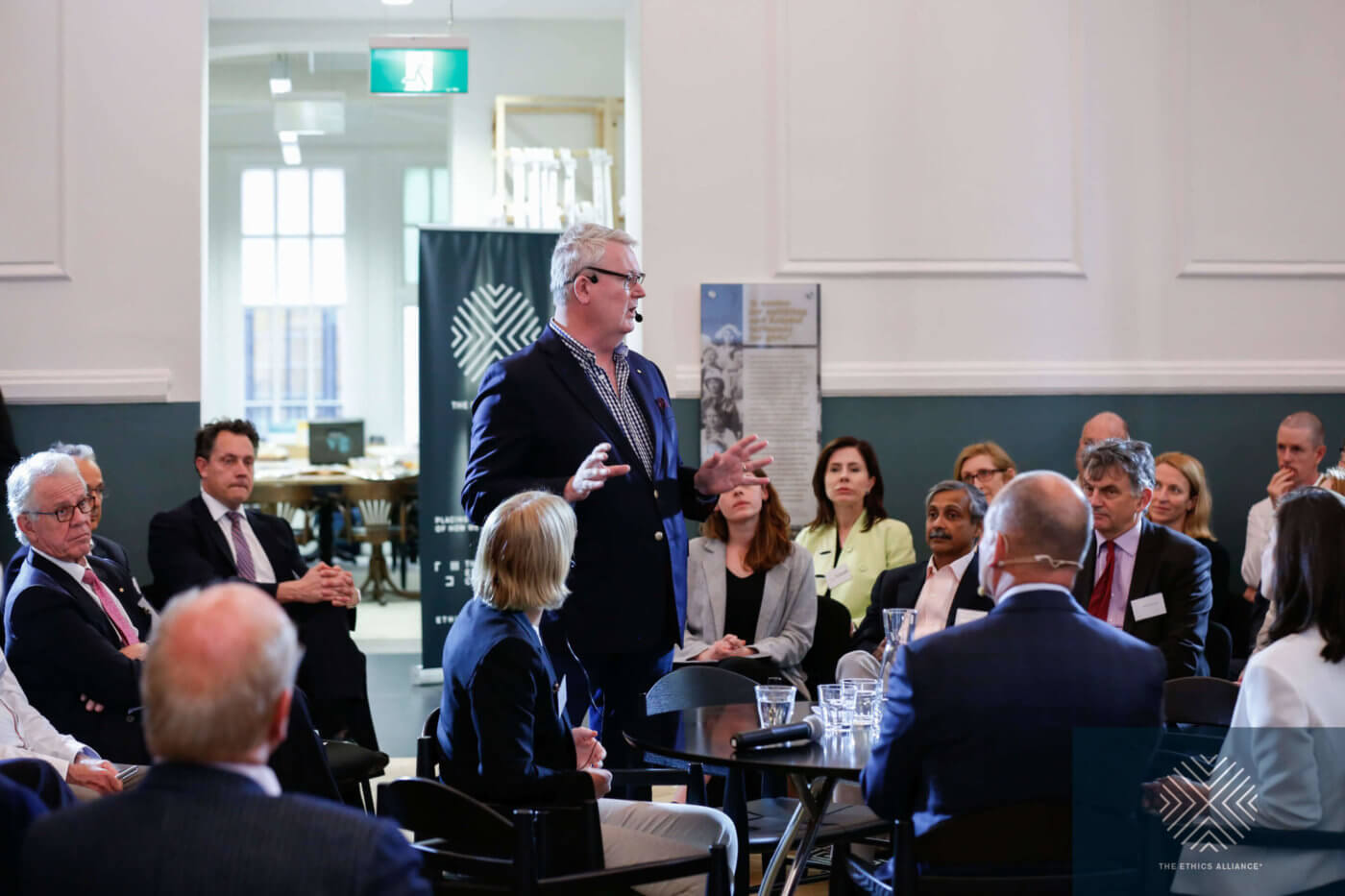Big Thinker: Ayaan Hirsi Ali
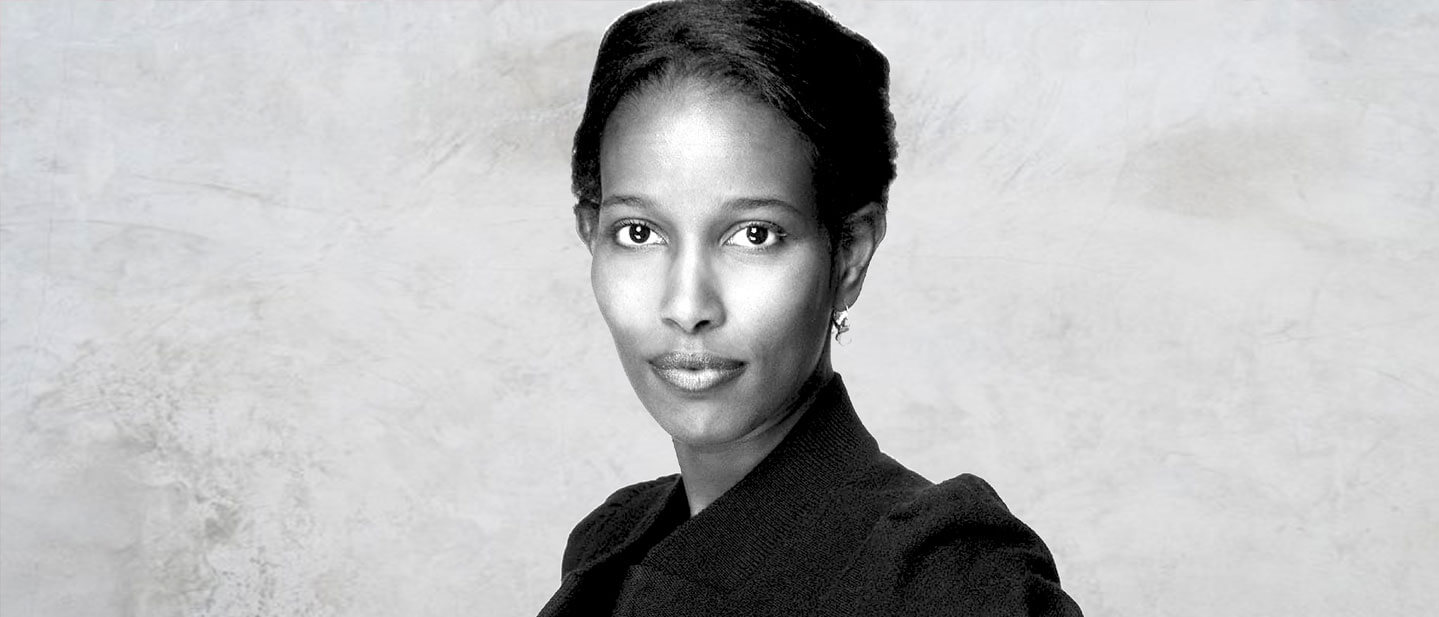
Threatened by Muslim extremists, boycotted by Western activists, Ayaan Hirsi Ali (1969—present) has literally put her life on the line to promote her ideals of rational thinking over religious dogma.
Ayaan Hirsi Ali is a Somali born Dutch American writer best known for her fierce criticism of Islam – the religion of her birth.
She sprung to international notoriety in 2004, when a Muslim extremist killed her Dutch filmmaker colleague Theo Van Gogh, knifing a hand written letter into his chest which called for Hirsi Ali to die next. The extremist targeted the pair for making a film mocking Islam’s treatment of women.
This brush with death only strengthened Hirsi Ali’s resolve to champion her ideals of enlightenment values over religious intolerance. She went on to author four books condemning Islamic teaching and practice.
Fluent in six languages, Hirsi Ali regularly travels the globe on speaking tours, skewering Islam and its local defenders in her articulate, charming style.
She doesn’t appeal to everyone though. The controversial writer has drawn the ire of Muslims and left wing groups who accuse her of anti-Islamic bigotry. Loathed by fundamentalists, she is forced to travel with armed security.
From believer to infidel
Hirsi Ali’s 2006 autobiography Infidel chronicled her extraordinary life journey from devout Somali child to Dutch politician to celebrity atheist intellectual.
Born to a Muslim family, Hirsi Ali says she was five years old when her grandmother ordered a man to undertake a female genital mutilation procedure on her. As a child, she was a believer who read the Qu’ran, wore a hijab and attended an Islamic school.
Looking back, the writer could see all that was wrong with her upbringing – violent beatings, unquestioning faith and rigid enforcement of gender roles.
Hirsi Ali says she sought asylum in the Netherlands in 1992 to flee her father’s attempt to arrange her marriage.
In her new home, the avid reader devoured the writing of enlightenment thinkers like Voltaire, Mill and Locke. These authors taught her to question blind faith and instead embrace science and rational thought.
After working as a translator and researcher, Hirsi Ali was elected to Dutch Parliament in 2002. She used her platform to criticise Islam and Muslim immigration.
Islam ‘is the problem’
Hirsi Ali holds the view that the problem with Islam is not simply a minority of extremists who give the religion a bad name:
“The assumption is that, in Islam, there are a few rotten apples, not the entire basket. I’m saying it’s the entire basket” – Ayaan Hirsi Ali
She argues violence is inherent in the core Islamic text and this is something most Muslims fail to recognise.
According to Hirsi Ali, Muslims can be categorised into three groups.
First, there are “Medina Muslims”, who seek to force extreme sharia law out of their religious duty.
Second, “Mecca Muslims”, are a majority of the faith who are devout but don’t practice violence. The problem with this group, says Hirsi Ali, is they fail to acknowledge or reject the violence in their own religious text.
The third group, “Muslim reformers”, explicitly reject terrorism and promote the separation of religion and politics.
Hirsi Ali argues this third reformer group must overcome the extremists to win the hearts and minds of a majority of Muslims.
Feminist hero or anti-Muslim bigot?
Ayaan Hirsi Ali was initially seen as a feminist activist who championed the cause of oppressed Muslim women. After moving to the US in 2006, she’s associated herself more with right wing groups than women rights’ activists. She became a fellow at the conservative think tank American Enterprise Institute and a regular interviewee on Fox News.
Married to historian Niall Ferguson, the couple have been described as “the Brad Pitt and Angelina Jolie of the intellectual right”.
She has also tweeted her support for Brett Kavanaugh, who was confirmed to the US Supreme Court despite allegations of past sexual assault.
Hirsi Ali’s right wing views and harsh criticism of Islam has seen Western activists target her alongside Muslim fundamentalists.
In 2014, Brandeis University in the US reversed its decision to award her with an honorary degree following objections from students.
In 2017, she cancelled a planned visit to Australia amid security concerns and a petition protesting her speaking appearance.
The Southern Poverty Law Center – a US advocacy group famous for defending civil rights – once categorised her as an anti-Muslim extremist.
Hirsi Ali says she can’t understand why she’s become the enemy:
“It has always struck me as odd that so many supposed liberals in the West take their side rather than mine … I am a black woman, a feminist and a former Muslim who has consistently opposed political violence”.
But if terrorists don’t deter her, activists have no chance. Hirsi Ali will continue to tread her dangerous path to promote what she believes are true liberal values.
Ethics in your inbox.
Get the latest inspiration, intelligence, events & more.
By signing up you agree to our privacy policy
You might be interested in…
Opinion + Analysis
Politics + Human Rights
Where do ethics and politics meet?
Opinion + Analysis
Business + Leadership, Politics + Human Rights
Hunger won’t end by donating food waste to charity
Opinion + Analysis
Health + Wellbeing, Politics + Human Rights
Constructing an ethical healthcare system
Opinion + Analysis
Climate + Environment, Politics + Human Rights, Relationships
This is what comes after climate grief
BY The Ethics Centre
The Ethics Centre is a not-for-profit organisation developing innovative programs, services and experiences, designed to bring ethics to the centre of professional and personal life.
You don’t like your child’s fiancé. What do you do?

You don’t like your child’s fiancé. What do you do?
Opinion + AnalysisRelationships
BY The Ethics Centre 18 NOV 2018
Your child is getting married. A mixture of pride, grief and trepidation have been gathering steam for a while now.
You don’t know how you’re going to feel on the day, but when you see your child go through one of the most ubiquitous rites of passage there is, you can’t guarantee there won’t be tears of love.
Except for one snag.
You don’t like their fiancé.
It’s heartbreaking. What should have been a moment of elation at your child’s joy is soured. You don’t understand why they’re making such a huge commitment to their partner or how you will live with that choice.
Perhaps you don’t think they’re good enough, or you don’t get along with them as much as you’d like. Maybe you see them bringing unhappiness into your child’s life – now or in the future. They might have strange attitudes to parenting or relationships. They might seem plain dangerous. Either way, there’s one question you’re asking…
What should you do?
In this situation, consider what a good parent looks like. Do they support, protect, and nurture their child? Do they allow them to make their own mistakes? Are they honest and fair?
Being honest may mean causing great hurt. Being fair may mean accepting the consequences of your child’s independence. Protecting your child may mean treating your fears as truth. But to what end? And by what means?
Wedding dilemmas splitting you in two? Book a free appointment with Ethi-call. A non-partisan, highly trained professional will help you see through chiffon to make decisions you can live by.
On one hand, what actions present you as the person you want to be? Are they the actions of someone courageous, patient, and wise? Or someone petty, panicky, and controlling?
On the other hand, what actions risk damaging the relationship between you and your child? Or your future child-in-law? What situation necessitates speaking up? Or more drastic measures?
If you decide your concerns aren’t that serious, is there a way you could use this situation to build a stronger relationship with your child and a better understanding of the partner they love?
A lot of the time, when we are faced with an ethical dilemma, we see in binaries. Black or white, either or. Taking the time to slow down our thinking and consider the situation in different ways can help new pathways emerge – even if that means stepping back and living with the decisions another person has made.
So, before you end up expressing your reservations in panic, blame, and threats to boycott the wedding, take a breath. Step back, contemplate who you aspire to be as parent, what actions you feel are right and available to you and get creative.
If you or someone you know is experiencing violence and need help or support, please contact 1800RESPECT. Call 000 for Police and Ambulance help if you are in immediate danger.
Ethi-call is a free national helpline available to everyone. Operating for over 25 years, and delivered by highly trained counsellors, Ethi-call is the only service of its kind in the world. Book your appointment here.
Follow The Ethics Centre on Twitter, Facebook, Instagram and LinkedIn.
Ethics in your inbox.
Get the latest inspiration, intelligence, events & more.
By signing up you agree to our privacy policy
You might be interested in…
Opinion + Analysis
Politics + Human Rights, Relationships
Assisted dying: 5 things to think about
Big thinker
Relationships, Society + Culture
Big Thinker: Socrates
WATCH
Relationships
What is ethics?
Opinion + Analysis
Relationships, Society + Culture
The #MeToo debate – recommended reads
BY The Ethics Centre
The Ethics Centre is a not-for-profit organisation developing innovative programs, services and experiences, designed to bring ethics to the centre of professional and personal life.
The moral life is more than carrots and sticks

The moral life is more than carrots and sticks
Opinion + AnalysisHealth + Wellbeing
BY Matthew Beard 16 NOV 2018
Almost everywhere I go to talk about ethics, I face some variation of the question: ‘Why be ethical?’ The question flummoxes and depresses me.
That’s partly because I can’t help but feel the question is basically ‘What’s in it for me?’ dressed up with a bit of academic, devil’s advocate flavour. But it’s also because to ask that question at all, you’ve got to have a pretty bleak sense of who people, at their core, really are.
But all the same, there are lots of people who have set out to answer precisely this question. Most of them are somehow connected to the world of institutions — government, business, non-profits and so on. You know, all the groups who studies suggest are haemorrhaging trust.
There’s nothing wrong with answering this question per se — in fact, it’s an interesting and challenging project that’s challenged philosophers since more or less the time the disciplined divorced from theology. But the answers are leaving me more-or-less equally disheartened as the questions themselves.
One common answer has to do with trust. And the thinking fits pretty well into the carrot/stick dialectic. The carrot approach goes a bit like this: data tells us ethical organisations are more trusted by other stakeholders, recruit and retain better staff and might even make more money.
The stick approach goes like this: unethical behaviour leads to a decline in trust, which leads to increased regulation, reporting and accountability. It stifles innovation, restricts opportunities and costs money.
The second answer is alluded to in the discussion of trust: regulation. The reason you should be ethical is because if you don’t we’ll catch you and hold you accountable for what you’ve done. People can’t be trusted to do the right thing, so we introduce safeguards to stop them from doing the wrong thing.
These two arguments boil down to self-interest on one hand and fear on the other. They respond to the part of humanity that is self-interested, petty and manipulative. That’s not necessarily a problem — failing to manage this aspect of humanity usually leaves the most vulnerable to suffer — but it’s an incomplete picture of who we are.
“The more we conflate ethics with trust, regulatory standards or “enlightened self-interest”, the less space we allow for morality to play a salvific role — not just to stop bad, but to make good.”
About 250 years ago, the German philosopher Immanuel Kant wrote The Groundwork to the Metaphysics of Morals. Kant, in his brilliant but not-very-pithy way, argued that the only thing that has true moral worth is what he called ‘the good will’. The good will is the desire to do good for its own sake — regardless of the effects. Here’s Kant at his most poetic:
‘Even if by some particular disfavour of fate, or by the scanty endowment of a stepmotherly nature, this will should entirely lack the capacity to carry through its purpose; if despite its greatest striving it should still accomplish nothing, and only the good will were to remain … then, like a jewel, it would still shine by itself, as something that has full worth in itself.’
I worry that the way we talk about ethics today makes the formation of a good will, or some variation on it, impossible. This is because for regulatory and trust-based approaches to ethics, there’s always something outside morality that serves as motivation. It’s Santa Claus for grown-ups: we behave so we get presents instead of coal. And I’m not certain it works — I’m not inclined to trust someone who has ulterior motives for gaining my trust.
What’s more, it’s not clear how this approach to trust applies to groups who don’t need trust — think ‘too big to fail’ — and don’t have to fear regulation (perhaps they’re the ones who make the law). What reasons do they have for doing the right thing? And how might they define the right thing in a more morally sensitive way than pointing to their clean hands in the eyes of the law?
What is missing from this picture is anything that might generate a deep understanding — and love — of what’s good. The more we conflate ethics with trust, regulatory standards or “enlightened self-interest”, the less space we allow for morality to play a salvific role — not just to stop bad, but to make good.
I wholly understand the desire to minimise harm, prevent wrongdoing and serve justice. I also acknowledge the utility value in speaking the language of people’s desires — if people have been taught to think in terms of outcomes and self-interest, we may as well turn it to our advantage. But the more we do it, the more we entrench a mode of thinking that is at best narrow and at worst antithetical to the moral life itself.
It might still be that in the great moral trade-offs of life, protecting the vulnerable is more important that my high-minded philosophy. But we should at least know what we’re turning our back on — because in stopping people from doing bad, we might be preventing them from ever being good.
This article was originally written for Eureka St. Republished with permission.
Ethics in your inbox.
Get the latest inspiration, intelligence, events & more.
By signing up you agree to our privacy policy
You might be interested in…
Explainer
Health + Wellbeing
Ethics Explainer: Hedonism
Opinion + Analysis
Health + Wellbeing, Relationships, Science + Technology
Parent planning – we should be allowed to choose our children’s sex
Big thinker
Health + Wellbeing, Relationships
Big Thinker: Temple Grandin
Opinion + Analysis
Climate + Environment, Health + Wellbeing
Donation? More like dump nation
BY Matthew Beard
Matt is a moral philosopher with a background in applied and military ethics. In 2016, Matt won the Australasian Association of Philosophy prize for media engagement. Formerly a fellow at The Ethics Centre, Matt is currently host on ABC’s Short & Curly podcast and the Vincent Fairfax Fellowship Program Director.
Big Thinker: Noam Chomsky

Big Thinker: Noam Chomsky
Big thinkerPolitics + Human RightsRelationships
BY The Ethics Centre 12 NOV 2018
Noam Chomsky (1928—present) is one of the foremost scholars and activists of our time.
With over a hundred books, thirty honorary degrees, and a generation of aspiring leftists behind him, Chomsky’s life puts a practical lens on the motto ‘protest is patriotic’.
The human tendency towards freedom
Chomsky earned a PhD in linguistics for his theory of “universal grammar”, a theory where all people are “born knowing” shared properties that underpin all human language. These properties, which create what he calls a “language acquisition device”, are what helps babies pick complex languages up instinctively.
According to Chomsky, while language’s laws and principles are fixed, the manner in which they are generated are free and infinitely varied. This view of human nature is one that runs through Chomsky’s attitudes to linguistics or politics: we must protect the innate human tendency towards freedom.
Pessimist of intellect
Chomsky’s opposition to war and totalitarianism started early. He wrote his first paper on the threat of fascism at ten. He opposed the Vietnam War while working at MIT, a military-funded university. He called Gaza the world’s “largest open-air prison” and said the US bears full responsibility for Israel’s war crimes.
Chomsky’s public denunciations of US foreign policy in Central America and East Timor, its interference in Middle Eastern elections and the shoot-first-ask-later’ type of diplomacy have drawn widespread ire and admiration. At the height of his fame in the 70s, it was discovered the CIA was keeping tabs on him and publicly lying about doing so.
Noam Chomsky’s consistent and vocal criticism of the US government comes from the belief that he, as a member of that country, holds a moral responsibility to stop it from committing crimes. That, and it’s far more effective than criticising a government that isn’t responsible for him.
“States are not moral agents; people are, and can impose moral standards on powerful institutions.”
Manufacturing consent
In what is arguably Chomsky’s most famous work, ‘Manufacturing Consent’, he outlined mainstream media’s complicity with government and business interests. He traced the capitalist formula of selling a product at a profit to the highest bidder in relation to the media. Here, people are the product and advertisers are bidding for our attention. Compare this with the monopoly social media has over our time and the ensuing competition for available ad space, and you’ll notice this line of argument growing in prescience.
Chomsky argued the advertising market is shaped by the external conditions of the state. It’s in their best interests to placate their ‘product’ and water down anything that would spur them to act against it. Any dissenting opinion is either ignored or presented as an anomaly. This is anti-democratic, said Chomsky, for a nation is only democratic insofar as government policy accurately reflects informed public opinion.
“If we don’t believe in free expression for people we despise, we don’t believe in it at all.”
Speak truth to power
Fred Halliday, an Irish academic, has criticised Chomsky for overestimating the power and influence of the US. Harvard psychologist Steven Pinker, Oxford historian Stephen Howe, and linguist Neil Smith, have called him a fierce and aggressive moral crusader, who dismisses critics as unqualified, mistaken, or even “charlatans“.
Today, Chomsky is outspoken on what he considers the two greatest threats to humanity: nuclear war and climate change. But with NEG scrapped, the Doomsday Clock inching to midnight, and Congress split, it looks unlikely that decisive action against either of these threats will be carried out anytime soon.
Follow The Ethics Centre on Twitter, Facebook, Instagram and LinkedIn.
Ethics in your inbox.
Get the latest inspiration, intelligence, events & more.
By signing up you agree to our privacy policy
You might be interested in…
Opinion + Analysis
Relationships, Society + Culture
But how do you know? Hijack and the ethics of risk
Opinion + Analysis
Politics + Human Rights
Learning risk management from Harambe
Opinion + Analysis
Relationships
The role of emotions in ethics according to six big thinkers
Opinion + Analysis
Relationships
Paralympian pay vs. Olympian pay
BY The Ethics Centre
The Ethics Centre is a not-for-profit organisation developing innovative programs, services and experiences, designed to bring ethics to the centre of professional and personal life.
Big Thinker: Eleanor Roosevelt
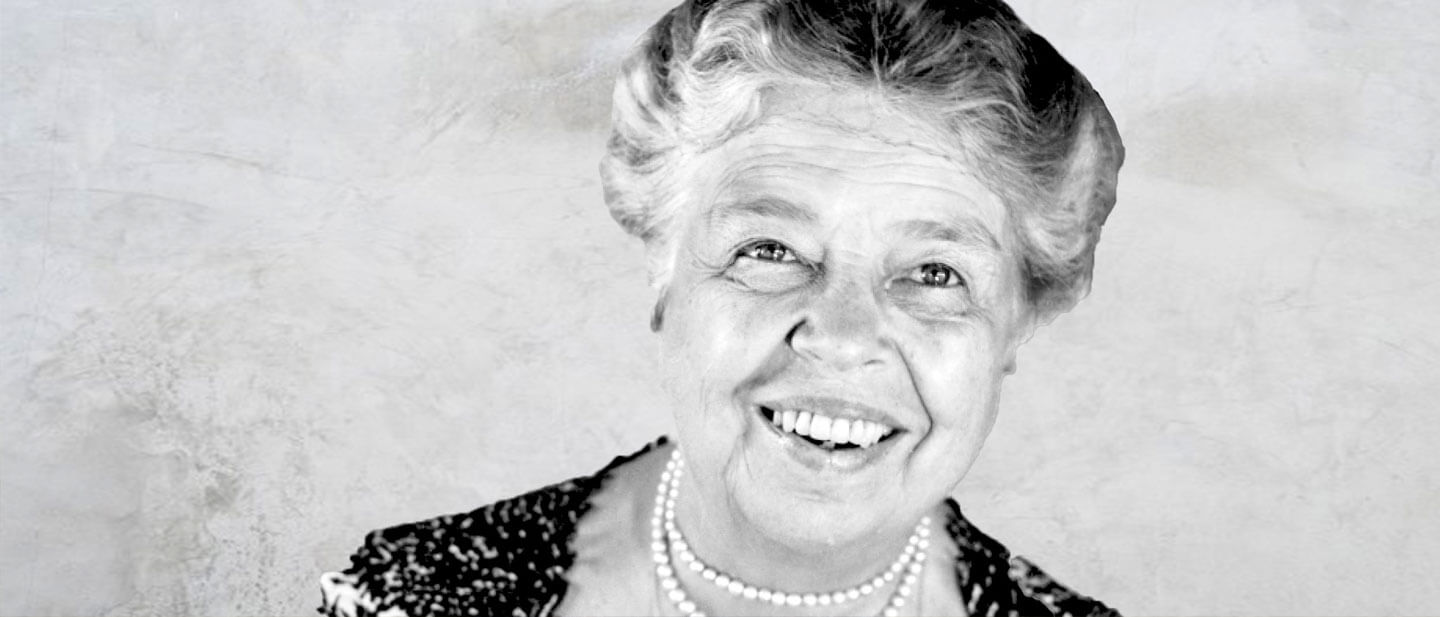
Big Thinker: Eleanor Roosevelt
Big thinkerPolitics + Human RightsRelationships
BY The Ethics Centre 11 NOV 2018
Eleanor Roosevelt (1884—1962) was an American diplomat and longest serving First Lady of the United States, best known for her work on the Universal Declaration of Human Rights.
She was affectionately dubbed “The First Lady of the World”. The thread running through her massive body of work is the single idea: fear threatens our lives and our democracies.
To live well means to live free from fear
Roosevelt lived in a world reeling from fascism. Though the Second World War had ended, the horrors of Nazism, the Holocaust and Stalinism revealed the depths people would succumb to out of fear and insecurity.
It wasn’t your garden variety type of fear she was concerned with. It was the type of widespread fear that debilitates courage, rewards conformity and stifles “the spirit of dissent”. By succumbing to this immobilising fear, Roosevelt said, we waste our lives.
“Not to arrive at a clear understanding of one’s own values is a tragic waste. You have missed the whole point of what life is for.”
Roosevelt wanted all people to know their values. As an influential public figure and patriotic American, she especially wanted this for her country.
This wasn’t without reason. The growing fear of political others (McCarthyism) and racial others (the push for segregation) mobilised Roosevelt and emboldened her stance. She didn’t want conformity to win.
“When you adopt the standards and the values of someone else or a community or a pressure group, you surrender your own integrity. You become, to the extent of your own surrender, less of a human being.”
Find a teacher in every person you meet
Roosevelt felt the danger of fear and conformity went beyond the trauma of war. It could quash “a spirit of adventure”, a way of viewing and experiencing everyday life that made you a better person.
She wasn’t talking about a thrill seeking, you-only-live-once, way of navigating the world. She meant close mindedness – denying your life experiences the opportunity to change your mind and mould your actions.
“Learning and living are really the same thing, aren’t they? There is no experience from which you can’t learn something. When you stop learning you stop living in any vital or meaningful sense. And the purpose of life is to live it, to taste experience to the utmost, to reach out eagerly and without fear for newer and richer experience.”
Roosevelt believed that everyone has something to teach you, and you are the ultimate beneficiary. Your character, your actions and your democratic polity.
And some might find being motivated by self-betterment alone to be selfish. After all, shouldn’t we do good simply because it is good? Isn’t it more noble to be motivated by what Kant called “good will”, or a moral duty?
Even if it’s possible that realizing motivation from a place of moral obligation is a higher ideal, Roosevelt was grounded in the everyday. She wasn’t concerned with principles the vast majority of a traumatised, distrustful nation would find out of reach, so she focused on the individual.
A principled life
The most remarkable thing about Roosevelt aren’t necessarily her ideals. It was her moral gumption to act on them even if they were unorthodox for the times or grossly unpopular.
She lobbied for greater intakes of World War II refugees when immigration was not supported by many Americans still reeling from the hardships of the Great Depression. She criticised her husband, President Franklin Roosevelt, for a policy intended to address the post-Depression housing market crash that segregated black and white citizens.
She broke with tradition by inviting African American guests to the White House. She spoke out against the internment of Japanese soldiers to the very population grieving the 2403 Americans they killed at Pearl Harbour (in comparison, it’s reported 55 Japanese lives were lost).
Roosevelt’s reputation for loving all has not gone unchallenged. She has been accused of taking sides in the Israeli-Palestinian conflict in a way that contravenes the Universal Declaration of Human Rights she worked on. While famous for wanting to protect displaced post WWII refugees, who were often Jewish, she felt the solution to the Israel-Palestine conflict was to resettle indigenous Palestinians in Iraq – the suggestion being she had a Zionist bias.
Roosevelt nevertheless maintains her name as a pioneer in humanitarian efforts who walked her talk. Fast forward to today’s polarised political spectrum, and her story reminds us the tools to make it through are there.
Follow The Ethics Centre on Twitter, Facebook, Instagram and LinkedIn.
Ethics in your inbox.
Get the latest inspiration, intelligence, events & more.
By signing up you agree to our privacy policy
You might be interested in…
Opinion + Analysis
Relationships
Metaphysical myth busting: The cowardice of ‘post-truth’
Opinion + Analysis
Business + Leadership, Relationships
Unconscious bias: we’re blind to our own prejudice
Opinion + Analysis
Health + Wellbeing, Relationships
Is it ok to visit someone in need during COVID-19?
Opinion + Analysis
Society + Culture, Politics + Human Rights
What happens when the progressive idea of cultural ‘safety’ turns on itself?
BY The Ethics Centre
The Ethics Centre is a not-for-profit organisation developing innovative programs, services and experiences, designed to bring ethics to the centre of professional and personal life.
The danger of a single view

There are times in the history of every nation when its character is tested and defined. Too often it happens with war, natural disasters or economic collapse. Then the shouting gets our attention.
But there are also our quieter moments – the ones that reveal solid truths about who we are and what we stand for. We are in one of those moments right now.
How should we recognise Indigenous Australians? Can our economy be repaired in an even-handed manner? How will we choose if forced to decide between China and the United States? How do we create safe ways for people seeking asylum? Can we grow our economy and protect our people and environments? These are just some of the questions we face.
And here’s another question. Do we have the capacity to talk about these things without tearing ourselves and each other apart? There are some safe places for open conversation about difficult questions. Twenty five years ago I began work at The Ethics Centre, a not-for-profit dedicated to creating such questions.
The Festival of Dangerous Ideas is one such place. This weekend, 1400 Sydneysiders will gather at the Festival of Dangerous Ideas – in a brand new home on Cockatoo Island – to explore different views and perspectives on issues surrounding truth, trust and the battle of polarities in our society.
Why host a festival to explore dangerous ideas?
Sadly, there is a growing ‘fragility’ across Australian society. The demand for crystalline ideological purity (you’re completely ‘with us’ or ‘against us’) puts us at risk of a fractured and stuffy world of absolutes.
Too often, I see conversations shut down before they have even begun. People with a contrary point of view are faced with outrage, shouted down or silenced by others driven by the certainty of righteous indignation. In such a world, there is no nuance, no seeking to understand the grey areas or subtleties of argument.
“Attempts to prove to people that they are wrong just leads to stalemate. Barricades go up and each side lobs verbal ‘grenades’. There is another way. “
This phenomenon crosses the political spectrum – embracing ‘conservatives’ and ‘progressives’ alike. In my opinion, it is the product of a self-fulfilling fear that our society’s ‘ethical skin’ is too thin to survive the prick of controversy and debate. This is a poisonous belief that drains the life from a liberal democracy.
Fortunately, the antidote is easily at hand. In essence we need to spend less time trying to change other people’s minds and more in trying to understand their point of view – by taking them entirely seriously.
Why make this change? Because attempts to prove to people that they are wrong just leads to stalemate. Barricades go up and each side lobs verbal ‘grenades’. There is another way. We could allow people to work out what the boundaries are for their own beliefs. Working out the lines we cannot cross is often the first step towards others and can only happen constructively when people feel safe. Giving people the space to fall on just the right side of such lines can make a world of difference.
So I wonder, might we pause for a moment, climb down from our battle stations and call a cease-fire in the wars of ideas? Might we recognise the person on the other side of an issue may not be unprincipled? Perhaps they’re just differently principled. Can we see in the face of our ideological opponent another person of good will? What then might we discover about each other; what unites and what divides? What then might we understand about the issues that will define us as a people?
Let’s rediscover the art of difficult discussions in which success is measured in the combination of passion and respect. Let’s banish the bullies – even those who claim to be ‘well-intentioned’. They have no place in the conversations we now need to have.
Follow the #FODI conversation on Twitter, and keep an eye on our Instagram for on the ground action at The Festival of Dangerous Ideas.
Ethics in your inbox.
Get the latest inspiration, intelligence, events & more.
By signing up you agree to our privacy policy
You might be interested in…
Opinion + Analysis
Relationships
Why learning to be a good friend matters
Opinion + Analysis
Society + Culture, Relationships
There is more than one kind of safe space
Opinion + Analysis
Relationships
Freedom and disagreement: How we move forward
Opinion + Analysis
Relationships, Society + Culture
The Bear and what it means to keep going when you lose it all
BY Simon Longstaff
Simon Longstaff began his working life on Groote Eylandt in the Northern Territory of Australia. He is proud of his kinship ties to the Anindilyakwa people. After a period studying law in Sydney and teaching in Tasmania, he pursued postgraduate studies as a Member of Magdalene College, Cambridge. In 1991, Simon commenced his work as the first Executive Director of The Ethics Centre. In 2013, he was made an officer of the Order of Australia (AO) for “distinguished service to the community through the promotion of ethical standards in governance and business, to improving corporate responsibility, and to philosophy.” Simon is an Adjunct Professor of the Australian Graduate School of Management at UNSW, a Fellow of CPA Australia, the Royal Society of NSW and the Australian Risk Policy Institute.
Ethics Explainer: Scepticism

Scepticism is an attitude that treats every claim to truth as up for debate.
Religion, philosophy, science, history, psychology – generally, sceptics believe every source of knowledge has its limits, and it’s up to us to figure out what those are.
Sometimes confused with cynicism, a general suspicion of people and their motives, ethical scepticism is about questioning if something is right just because others say it is. If not, what will make it so?
Scepticism has played a crucial role in refining our basic understandings of ourselves and the world we live in. It is behind how we know everything is made of atoms, time isn’t linear, and that since Earth is a sphere, it’s quicker for planes to fly towards either pole instead of in a straight line.
Ancient ideas
In Ancient Greece, some sceptics went so far as to argue since nothing can claim truth it’s best to suspend judgement as long as possible. This enjoyed a revival in 17th century Europe, prompting one of the Western canon’s most famous philosophers, René Descartes, to mount a forceful critique. But before doing so, he wanted to argue for scepticism in as holistic a fashion as possible.
Descartes wanted to prove certain truths were innate and could not be contested. To do so, he started to pick out every claim to truth he could think of – including how we see the world – and challenge it.
For Descartes, perception was unreliable. You might think the world around you is real because you can experience it through your senses, but how do you know you’re not dreaming? After all, dreams certainly feel real when you’re in them. For a little modern twist, who’s to say you’re not a brain in a vat connected up to a supercomputer, living in a virtual reality uploaded into your buzzing synapses?
This line of thinking led Descartes to question his own existence. In the midst of a deeply valuable intellectual freak out, he eventually came to realise an irrefutable claim – his doubting proved he was thinking. From here, he deduced that ‘if I think’, then I exist.
“I think, therefore I am.”
It’s the quote you see plastered over t-shirts, mugs, and advertising for schools and universities. In Latin it reads, “Cogito ergo sum”.
Through a process of elimination, Descartes created a system of verifying truth claims through deduction and logic. He promoted this and quiet reflection as a way of living and came to be known as a rationalist.
The arrival of the empiricist
In the 18th century, a powerful case was made against rationalism by David Hume, an empiricist. Hume was sceptical of logical deduction’s ability to direct how people live and see the world. According to Hume, all claims to truth arise from experiences, custom and habit – not reason.
If we followed Descartes’ argument to its conclusion and assessed every single claim to truth logically, we wouldn’t be able to function. Navigating throughout the world requires a degree of trust based on past experiences. We don’t know for sure that the ground beneath us will stay solid. But considering it generally does, we trust (through inductive reasoning) that it will stay that way.
Hume argued memories and “passions” always, eventually, overrule reason. We are not what we think, but what we experience.
Perhaps you don’t question the nature of existence at the level of Descartes, but on some level, we are all sceptics. Scepticism is how we figure out who to confide in, what our triggers are, or if the next wellness fad is worth trying out. Acknowledging how powerful our habits and emotions are is key to recognising when we’re tempted to overlook the facts in favour of how something makes us feel.
But part of being a sceptic is knowing what argument will convince you. Otherwise, it can be tempting to reduce every claim to truth as a challenge to your personal autonomy.
Scepticism, in its best form, has opened up mind-boggling ways of thinking about ourselves and the world around us. Using it to be combative is a shortsighted and corrosive way to undermine the difficult task of living a well examined life.
Ethics in your inbox.
Get the latest inspiration, intelligence, events & more.
By signing up you agree to our privacy policy
You might be interested in…
Opinion + Analysis
Climate + Environment, Politics + Human Rights, Relationships
This is what comes after climate grief
Opinion + Analysis
Relationships
We already know how to cancel. We also need to know how to forgive
Opinion + Analysis
Relationships
What is the definition of Free Will ethics?
Opinion + Analysis
Health + Wellbeing, Relationships
This isn’t home schooling, it’s crisis schooling
BY The Ethics Centre
The Ethics Centre is a not-for-profit organisation developing innovative programs, services and experiences, designed to bring ethics to the centre of professional and personal life.
Big Thinker: Adam Smith
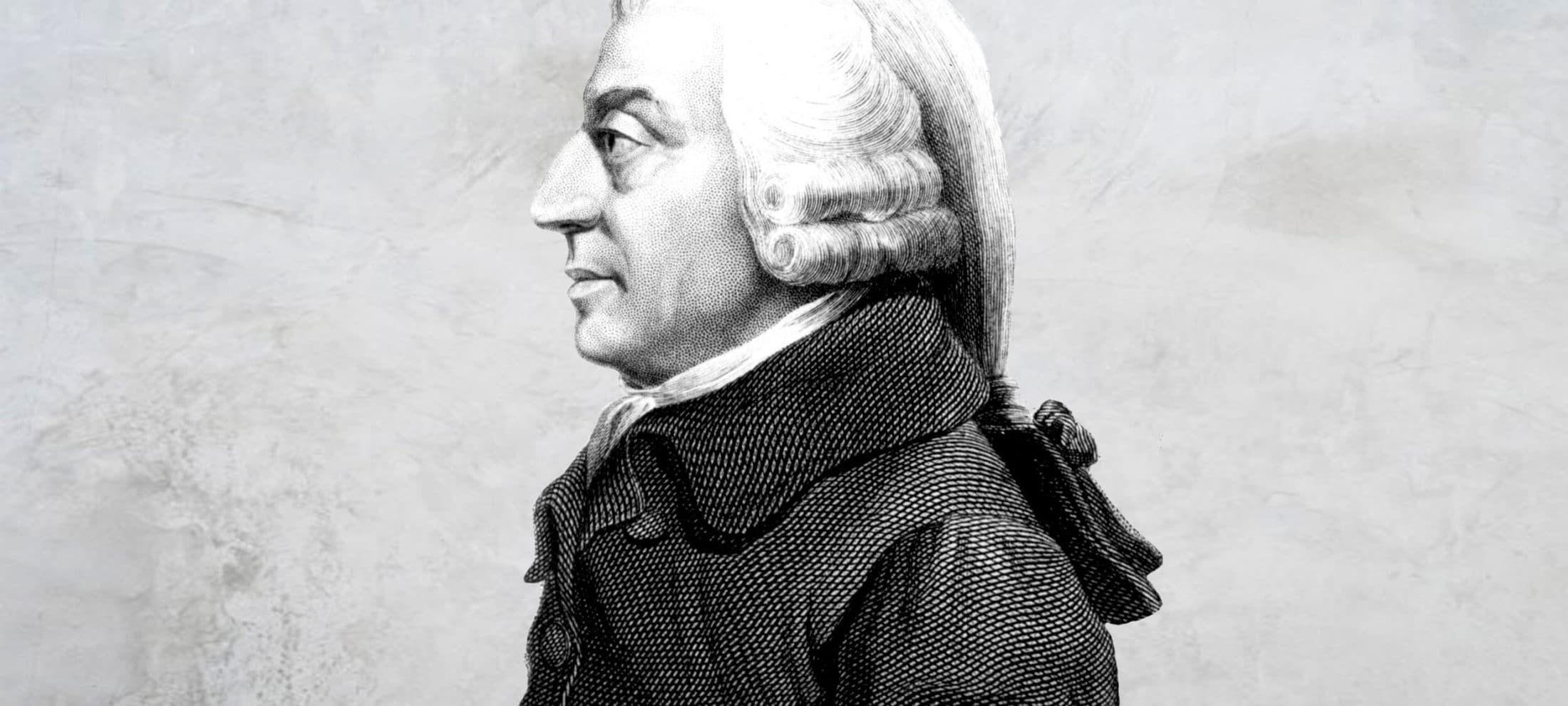
Big Thinker: Adam Smith
Big thinkerPolitics + Human RightsRelationships
BY The Ethics Centre 26 SEP 2018
It’s no exaggeration to say the ideas of Scottish moral philosopher Adam Smith (1723—1790) have shaped the world we live in.
By providing the core intellectual framework in defence of free markets, he positioned human liberty and dignity at the centre of trade and money – all for the common good.
Adam Smith, the pioneer
In the 18thcentury, the race to colonise as many resource rich places as possible meant powerful countries were often at war. Companies which added to the wealth of empires were protected by grateful governments, creating trade monopolies that seemed impossible to dismantle. This was the heyday of mercantilism.
Smith noticed how these actions created concentrations of wealth, benefiting the wealthy while the labour class struggled to survive. His first book, The Theory of Moral Sentiments, argued that the virtues of sympathy and reciprocity could tame greed.
His second, The Wealth of Nations, was about promoting a new way of approaching wealth that was as lucrative as it was just. The approach Smith adopted was multifaceted: economic, defensive, legal, and moral.
Smith argued that countries were competing for the wrong thing. Wealth wasn’t to be found in commodities like gold and silver. It resided in human labour and ingenuity. Smith encouraged countries that would normally look externally for wealth, suppressing the labour class and enslaving others, to look internally instead.
If the labour class could have the freedom to pick their job, all the while knowing the government would leave the money they made well alone, why wouldn’t they work hard at it? They would produce goods and services of even higher quality, and the government could buy these and trade them with each other. Everyone wins.
Collaboration would mean countries wouldn’t need to waste money on defence and war. They could save and accumulate capital, and invest that into better machinery, freeing people to work more productively. The labour class would grow richer, and so would the nation.
Smith stressed that in order for a free market to ensure fair pay for fair work, contracts had to be honoured, people had to keep their word, and governments mustn’t get into debt or take people’s property. Theft, negligence, mistakes, or irresponsible government spending must to be managed by the rule of law. And in the case of foreign powers, defence.
Thus, for Smith – a free market must rest on a sound ethical foundation. Given this, he argued for moral education of a kind that would lead people to be honourable and behave justly. This included the rich. Smith thought that an appeal to ‘enlightened’ self-interest might lead them to act honourably. By lavishing praise, accolades, and rewards on those who spend their wealth in charity, the rich gain the status and rank they really desire.
Adam Smith, the legacy
Claims of plagiarism, usury, inconsistency, racism, and all else aside, the major complaint directed towards Smith is his concept of the “invisible hand”. His observation that self-interested individuals end up benefiting the common good – that they are “led by an invisible hand to promote an end that was no part of his intention.” – has prompted some critics to label him naïve, idealistic, or even immoral.
The following quotation (misattributed to John Maynard Keynes) sums it up: “Capitalism is the astounding belief that the wickedest of men will do the wickedest of things for the greatest good of everyone”. But that plays into the Smith = laissez-faire trap, and ignores the safeguards he proposed against human corruption.
Smith did not think greed was good, saying this removed “the distinction between vice and virtue”, nor did he believe business interests and the public interest necessarily coincide. Instead, his perspective was that market competition forced people to act in ways that benefited others, regardless of their intention. And when it failed to do that, an overarching authority should step in. For Smith, markets have no intrinsic value – they are merely tools for the betterment of life for all.
No doubt the world we live in now is vastly different to pre-Industrial Scotland. Mass media, the Internet, the textile industry, factory farms, surveillance, housing prices, offshore tax havens…much would have seemed strange and unfamiliar to Smith. But his work and legacy leave a lesson in economics, ethics, and politics – all the more prescient in a world where the more things change, the more they stay the same.
Follow The Ethics Centre on Twitter, Facebook, Instagram and LinkedIn.
Ethics in your inbox.
Get the latest inspiration, intelligence, events & more.
By signing up you agree to our privacy policy
You might be interested in…
Opinion + Analysis
Politics + Human Rights
Farhad Jabar was a child – his death was an awful necessity
Big thinker
Relationships
Big Thinker: Kate Manne
Opinion + Analysis
Politics + Human Rights, Society + Culture
On truth, controversy and the profession of journalism
Opinion + Analysis
Relationships
In defence of platonic romance
BY The Ethics Centre
The Ethics Centre is a not-for-profit organisation developing innovative programs, services and experiences, designed to bring ethics to the centre of professional and personal life.
Ethics Explainer: Stoicism

What do boxers, political figures, and that guy who’s addicted to Reddit all have in common?
They’ve probably employed the techniques of stoicism. It’s an ancient Greek philosophy that offers to answer that million dollar question, what is the best life we can live?
Hard work, altruism, prayer or relationships don’t take the top dog spot for the stoic. Instead, they zoom out and divide the world (if you’ll forgive the simplicity) into black and white: what you can control and what you can’t.
It’s the lemonade school of philosophy. The central tenet being:
“When life gives you lemons, make lemonade.”
Stoics believe that everything around us operates according to the law of cause and effect, creating a rational structure of the universe called logos. This structure meant that something as awful as all your worldly possessions sinking into the ocean (Zeno of Cyprus), or as annoying as missing the last bus by a quarter of a minute, don’t make your life any worse. Your life remains as it is, nothing more, nothing less.
If you suffer, you suffer because of the judgements you’ve made about them. The ideal life where that didn’t happen is a fantasy, and there’s no point focusing on it. Just expect that pain, grief, disappointment and injustice are going to happen. It’s what you do in response to them that counts.
This philosophy was founded by said Zeno, who preached the virtues of tolerance and self control on a stone colonnade called the stoa poikile. It’s where stoicism found its name. It flourished in the Roman empire, with one of its most famous students being the emperor himself, Marcus Aurelius. Fragments of his personal writing survive in Meditations, revealing counsel remarkably humble and chastising for a man of his power.
Stoicism on emotion
Emotion presents an opportunity. There’s a reactive, immediate response, like blaming others when you feel ashamed, or panicking when you feel anxious. But there is a better reaction the stoics aim for. It matches the degree of impact, is appropriate for the context, is rationally sound, and in line with a good character.
Being angry at your partner for forgetting to put away the dishes isn’t the same as being angry at an oppressive government for torturing its citizens. But if it’s the emotion you focus on, all your good intentions aren’t guaranteed to stop you from messing up. After all, the red haze is formidable.
By practising this “slow thinking” and making it a habit, you can cultivate the same self discipline to develop virtues like courage and justice. It’s these that will ultimately give your life meaning.
For others, emotions are more like the weather. It rains and it shines, and you just deal with it.
Stoicism assumes that focusing on control and analysing emotion is how virtues are forged. But some critics, including philosopher Martha Nussbaum, say that approach misses a fundamental part of being human. After all, control is transient too. Emotions – loving and caring for someone or something to such an extent that losing it devastates you – doesn’t make you less human. It’s part of being human in the first place.
Other critics say that it leads to apathy, something collective political action can’t afford. Sandy Grant, philosopher at University of Cambridge, says stoicism’s “control fantasy” is ridiculous in our interdependent, globalised world. “It is no longer a matter of ‘What can I control?’ but rather of ‘Given that I, as all others, am implicated, what should I do?”
Controlling emotion to navigate through life cautiously may not be desirable to you. But it is easy to see how channelling stoicism in certain situations can help us manage life’s unfortunate moments – whether they be missing the bus or something more harrowing.
Follow The Ethics Centre on Twitter, Facebook, Instagram and LinkedIn.
Ethics in your inbox.
Get the latest inspiration, intelligence, events & more.
By signing up you agree to our privacy policy
You might be interested in…
Opinion + Analysis
Climate + Environment, Politics + Human Rights, Relationships
This is what comes after climate grief
Opinion + Analysis
Relationships
Breaking news: Why it’s OK to tune out of the news
Opinion + Analysis
Relationships
The wonders, woes, and wipeouts of weddings
Explainer
Relationships
Ethics Explainer: Akrasia
BY The Ethics Centre
The Ethics Centre is a not-for-profit organisation developing innovative programs, services and experiences, designed to bring ethics to the centre of professional and personal life.
Democracy is still the least-worst option we have

Democracy is still the least-worst option we have
Opinion + AnalysisBusiness + LeadershipPolitics + Human Rights
BY Gordon Young 21 SEP 2018
If the last decade of Australian politics has taught us anything it is this: democracy is a deeply flawed system.
Between the leadership spills, minority governments, ministerial scandals, legal corruption, and campaign donations, democracy is leaving more of us disillusioned and distrustful.
And that’s just in Australia.
Overseas, various ‘democratic’ governments have handed us Brexit, Russian election tampering (both domestically and abroad), the near collapse of the Euro, the Chinese Government’s Social Credit scheme, and the potentially soon-to-be-impeached Trump Presidency.
It’s not surprising that many are looking for an alternative system to run the country. Something simpler, more direct. Something efficient and easy.
Something like capitalism.
This may seem absurd on first reading – after all, how can an economic system replace the political governance of an entire nation? But capitalism is more than how we trade goods and services. It spills into a broader socio-economic theory that claims it can better represent people nationally and abroad than democracy ever could. This is known as neoliberalism.
Neoliberals argue that we don’t need to rely on the promises of unaccountable representatives to run the government. We can let competition decide. Just as a free market encourages better products, why don’t we let the free market encourage better governance?
If Bob does a better job fixing your car than Frank, employ Bob and vote for that quality as the standard. Frank either picks up his game or goes out of business. If your neighbouring electorate’s MP does a better job representing you, pay him and vote for his policy. If people value businesses that treat their employees well, those businesses will succeed and others will change their practices to compete.
Where democracy asks you to trust in the honour of your leaders, and only gives you a chance to hold them to account every few years, neoliberalism lets you exercise your choice every single time you spend your money, every single day.
This is far from fantasy thinking. It is this essential idea that drives ideas like ‘small government’, privatisation of state infrastructure, decreasing business taxes, and cutting ‘red tape’ – remove government interference from the system and leave the decisions up to the people themselves.
On paper it is the perfect system of government – a direct democracy where every citizen constantly drives policy based on what they buy and why.
Great, right? Well, only if you’re a fan of feudalism. Because that is what such a system would inevitably produce.
Consider this: within democracy, who is in control? The elected government obviously has the reigns of power during their term (to a frankly frightening degree), but how do they maintain that power?
By being elected, of course. Whether they like it or not, every three to four years they at least have to pretend they care about the needs of the people. In reality it’s hardly as simple as ‘one person, one vote’ – between campaign donations, lobby groups, ‘cash for access’, and good old-fashioned connections, some citizens will always have more power than others – but the fact remains that within democracy, the people in power still need to care about the whims of their citizens.
Now consider this: within this ideal capitalist, neoliberal, vote-with-your-dollar system, who is in control? If you express your interests in this system through your purchases, then power is dispersed based on how much you spend, right?
Who does the most spending? The people with the most money.
Here is the critical question and the sting in tail of the neoliberalism: why should the people in control of such a society, where power is determined by wealth alone, give the slightest damn about you?
Whether sincere or not, democracy requires the decision makers to court all citizens at least every election (and a lot more frequently than that, if they know what’s good for them). But in a purely capitalist society, why would the power-players ever need to consult those without significant wealth, power, or influence?
Even in a democratic world a mere 62 people already own more money than half of the entire world’s population, and exert titanic power upon the world’s markets that no normal citizen can ever hope to challenge.
Remove the political franchise that democracy guarantees every citizen by default, and you remove any and all controls of how those ultra-rich exert the power this wealth grants them.
So while we may criticise democracy for its inefficiencies, and fantasise how much better it would all be if government ‘were run like a business’, such idle complaints miss the key value of democracy – that in granting each and every citizen the inalienable right to an equal vote, none of them can safely be ignored by those who would aspire to power.
Perhaps you believe that the neoliberal utopia would be a better system, and the 1 percent would never decide to relegate the masses back to serfdom. But the fact that such a decision would now depend entirely on their whims, should be enough to terrify any sane citizen.
Ethics in your inbox.
Get the latest inspiration, intelligence, events & more.
By signing up you agree to our privacy policy
You might be interested in…
Big thinker
Politics + Human Rights
Big Thinker: Peter Singer
Explainer
Business + Leadership
Ethics Explainer: Social license to operate
Opinion + Analysis
Business + Leadership
The Ethics Alliance: Why now?
Explainer
Politics + Human Rights, Relationships






